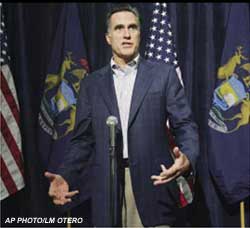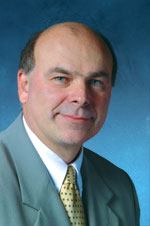The Man on the White Horse!
Lincoln E. Steed March/April 2008
Nearly seven years after 9/11, we are still trotting toward the cannon in hopes of defeating terrorism. Hundreds of billions of dollars in national treasure and thousands of lives litter the way...to what? Donald Rumsfeld spoke a truism when he opined that the effort would last our lifetimes. But few have really paused to adequately contextualize our position.
Of late, the stock market has trembled and slipped. The prospect of national financial collapse keeps investors selling and the Fed chairman busy adjusting expectations. I have read much analysis of the phenomenon, but have never read anyone willing to connect it in any way to lost treasure. True, there is some debate about the effectiveness of giving a cash payment to taxpayers in order to stimulate the economy, but only the "unlearned" on talkback radio call-ins wonder aloud how even more public debt can save us.
Perhaps in academia they are discussing the historical analogs to our position. I hope so, because the pre-election maneuvering and primary hype is surely setting us up for something historic..
We are rapidly approaching the moment and place where only a man on a white horse can save us.
Of course, during a presidential election, that is exactly the expectation that seizes the voters and drives public discourse. Other nations may have greater voter turnout than the United States, but few can equal the unbridled enthusiasm that is applied to the process here. Few respond as innocently to the convenient promises and easy solutions offered.

Far be it from me to suggest that religion is unimportant. It is the elephant in the room whenever we talk about terrorism. And there is no party pun intended here! We are indeed in a period of militant religion worldwide. It explains things from Darfur to Baghdad, from the Indian-Pakistani tensions to the rise of a Christian America agenda here.
Christians have every reason to feel reassured that a particular candidate is a fellow Christian. But the country as a whole has every reason to avoid making it a requirement. After all, the Constitution says succinctly: "No religious test shall ever be required" for public office. Unfortunately, we are ignoring the Constitution and effectively requiring a religious loyalty test.
Perhaps the saddest example has been the early treatment of Mitt Romney. Nominally a Christian, but of an affiliation easily characterized by other Christian sects as pseudo-Christian, Mitt responded in a way that made me cringe. While his, or any candidates', religious affiliation is doubtless an important part of the mix that goes into each voter making up their mind, it is illegal and certainly dangerous in a post-9/11 world for it to be determinative.
To his credit, Romney tackled the issue early and showed no shame in the fact of his personal faith. Top marks there. But in a pivotal speech to address the religion concern, he seemed to try to downplay his religious differences with mainstream Christianity and reinvent his Mormon identity as something akin to fundamentalist evangelicalism. The inference was that this is the acceptable American religious identity. That was unfortunate.
This magazine deplores efforts to redefine the United States as a Christian republic. It is historically unsupportable. A Christian society it might have been and might yet become again in the best sense if we Christians can differentiate piety from religiosity, but Americans of all faiths should recoil from a state-enjoined religious identity. After all, the religious dictatorship in England under Oliver Cromwell was a republic, too.
One of the more telling religious gaffes of the primary season came from Mike Huckabee at a time when his numbers were up and it appeared that the conservative base had latched on to him. Newsweek quoted him as saying, "I believe it's a lot easier to change the Constitution than it would be to change the Word of the living God (January 28, 2008, page 21)." This, according to the magazine, was uttered as he was "calling for two new constitutional amendments banning abortion and same-sex marriage in order to bring U.S. law in line with 'God's standards'" (Ibid.,). Now, Mike Huckabee in the past has said all the right things about separation of church and state and has written a very fine article for this magazine on the correct relationship between religious instruction and state education. Why would he seem to go so far off the reservation and endorse this extremist religious agenda?
I think an answer to that question and the overall issue of the obligatory issue of religion for this stable of candidates is that we are indeed looking at a transformative moment in church and state. In some ways people are looking to find a moral answer as much as a political direction.
To be sure, the process has moved on, and by the time you read this there will have been much of the usual political war in moving toward the confrontation between the final party picks. But religion has been established as major criteria by both parties, precisely at a moment when religious/moral issues are consuming much of the nation and the whole world.
I am sure we will hear much more of this when the pope of Rome addresses the United Nations. Already an expectation has been created that this will be a significant address. One cannot fault the Roman pontiff for putting forth whatever spiritual vision he is moved to. But the fact of a somewhat (remember John Paul II) charismatic religious leader speaking as a political leader at the United Nations is problematic and certainly allows for insertion of a particular religious agenda into world civil affairs.
Of course, it is now quite a few months since the president of Iran addressed the United Nations and riffed on about his spiritual agenda. The secular press hardly understood him as he elaborated on the nearness of the coming of the 12th imam—an event and appearance not dissimilar to the Christian expectation of the second coming of Christ. Of course, the imam is not to be Christ, but the conditions of chaos that precede his coming are similar to biblical predictions.
The Bible does say much about the appearance of the Man on the white horse. In the Apocalypse of John He is presented as going forth "conquering, and to conquer" (Revelation 6:2). That Man on the white horse is clearly Jesus Christ. It is an exciting image of Christian victory. It provides a clear way through the chaos of the days outlined for us in biblical prophecy.
However, in these times of distress we need to be clear about how we relate to the coming of a savior figure. I eagerly anticipate the coming of Jesus Christ. Someone's vision of a coming imam puts me more to mind of interreligious war. And voting in any political leader with an expectation that they can function as savior of national morality puts me to mind more of the horrible lessons of history—a tale of Caesars and persecution.


Lincoln E. Steed
Editor,
Liberty Magazine
Article Author: Lincoln E. Steed
Lincoln E. Steed is the editor of Liberty magazine, a 200,000 circulation religious liberty journal which is distributed to political leaders, judiciary, lawyers and other thought leaders in North America. He is additionally the host of the weekly 3ABN television show "The Liberty Insider," and the radio program "Lifequest Liberty."